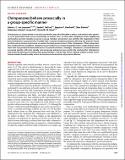Files in this item
Chimpanzees behave prosocially in a group-specific manner
Item metadata
| dc.contributor.author | van Leeuwen, Edwin J. C. | |
| dc.contributor.author | DeTroy, Sarah E. | |
| dc.contributor.author | Kaufhold, Stephan P. | |
| dc.contributor.author | Dubois, Clara | |
| dc.contributor.author | Schütte, Sebastian | |
| dc.contributor.author | Call, Josep | |
| dc.contributor.author | Haun, Daniel B. M. | |
| dc.date.accessioned | 2021-02-25T10:30:03Z | |
| dc.date.available | 2021-02-25T10:30:03Z | |
| dc.date.issued | 2021-02-24 | |
| dc.identifier | 272210774 | |
| dc.identifier | 469e162b-2506-4a55-9805-1ab79f8799fc | |
| dc.identifier | 000622481300008 | |
| dc.identifier | 85102072798 | |
| dc.identifier.citation | van Leeuwen , E J C , DeTroy , S E , Kaufhold , S P , Dubois , C , Schütte , S , Call , J & Haun , D B M 2021 , ' Chimpanzees behave prosocially in a group-specific manner ' , Science Advances , vol. 7 , no. 9 , eabc7982 . https://doi.org/10.1126/sciadv.abc7982 | en |
| dc.identifier.issn | 2375-2548 | |
| dc.identifier.other | ORCID: /0000-0002-8597-8336/work/89628092 | |
| dc.identifier.uri | https://hdl.handle.net/10023/21505 | |
| dc.description | Funding: EJCvL was funded by a Postdoctoral Fellowship awarded by the Research Foundation Flanders (FWO) and an ERC-Synergy Grant (no. 609819) awarded to JC. | en |
| dc.description.abstract | Chimpanzees act cooperatively in the wild, but whether they afford benefits to others, and whether their tendency to act prosocially varies across communities, is unclear. Here, we show that chimpanzees from neighboring communities provide valuable resources to group members at personal cost, and that the magnitude of their prosocial behavior is group specific. Provided with a resource-donation experiment allowing free (partner) choice, we observed an increase in prosocial acts across the study period in most of the chimpanzees. When group members could profit (test condition), chimpanzees provided resources more frequently and for longer durations than when their acts produced inaccessible resources (control condition). Strikingly, chimpanzees’ prosocial behavior was group specific, with more socially tolerant groups acting more prosocially. We conclude that chimpanzees may purposely behave prosocially toward group members, and that the notion of group-specific sociality in nonhuman animals should crucially inform discussions on the evolution of prosocial behavior. | |
| dc.format.extent | 10 | |
| dc.format.extent | 592345 | |
| dc.language.iso | eng | |
| dc.relation.ispartof | Science Advances | en |
| dc.subject | QL Zoology | en |
| dc.subject | RC0321 Neuroscience. Biological psychiatry. Neuropsychiatry | en |
| dc.subject | DAS | en |
| dc.subject.lcc | QL | en |
| dc.subject.lcc | RC0321 | en |
| dc.title | Chimpanzees behave prosocially in a group-specific manner | en |
| dc.type | Journal article | en |
| dc.contributor.sponsor | European Research Council | en |
| dc.contributor.institution | University of St Andrews. Centre for Social Learning & Cognitive Evolution | en |
| dc.contributor.institution | University of St Andrews. School of Psychology and Neuroscience | en |
| dc.identifier.doi | https://doi.org/10.1126/sciadv.abc7982 | |
| dc.description.status | Peer reviewed | en |
| dc.date.embargoedUntil | 2021-02-24 | |
| dc.identifier.grantnumber | 609819 | en |
This item appears in the following Collection(s)
Items in the St Andrews Research Repository are protected by copyright, with all rights reserved, unless otherwise indicated.

